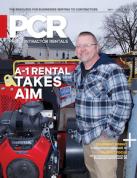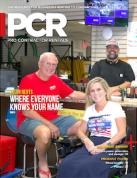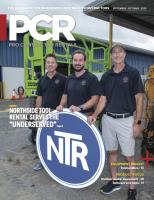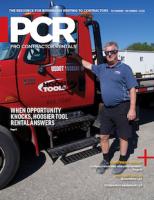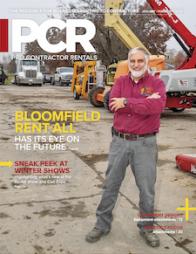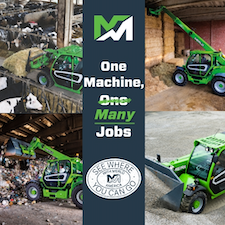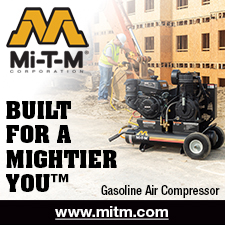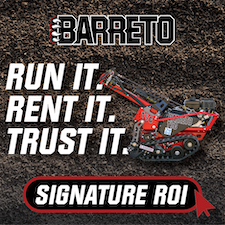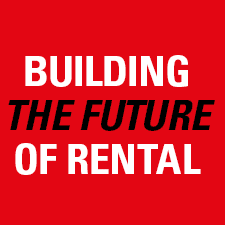Rental Center -- Bigger and Better
Empire Crane’s niche for specialty crane rentals feeds its equipment sales and service business.
by Clair Urbain
Brothers Luke and Paul Lonergan, co-owners of Empire Crane, run their business much like they describe their company name: In a straightforward, understandable way. “The name, I always touch base on, is that we are in the crane business and we are in the Empire State,” says Paul.
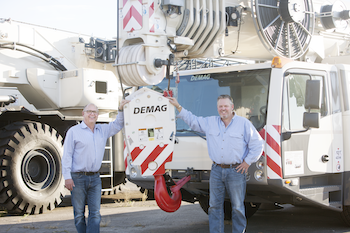 |
|
Luke and Paul Lonergan, co-owners of Empire Crane. |
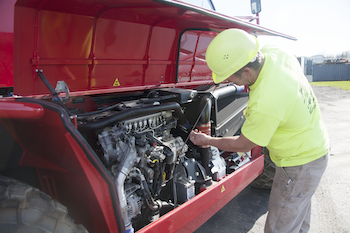 |
| Equipment rentals feed the sales and service components of Empire Crane’s business. Its territory stretches from Buffalo to Boston and the tip of Maine to the tip of New Jersey. Its headquartered in Syracuse, New York and it has two full-service depots in Bridgewater, New Jersey and Holbrook, Massachusetts. |
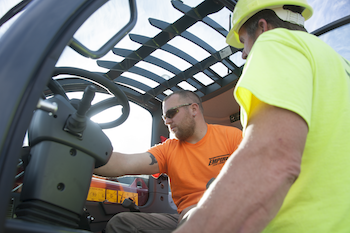 |
| Empire Crane’s rental fleet is made up of heavy-duty cranes that can work in a variety of environments. It represents Tadano, Demag Tadano Group, Tadano Mantis, Kobelco, Manitex, Terex, Magni and Broderson Manufacturing. |
The business, established by the brothers in 2002, started after working for years in the family’s heavy equipment dealership. “Luke and I started Empire Crane in January of 2002, after the September 11th tragedy in 2001. I had been in the heavy equipment world since the mid-’80s working for the family business; Luke got into the business a decade later after working in another family business that was outside of the heavy equipment world,” Paul says.
In 1998, Luke joined the family’s full-line, heavy equipment distributorship. He immediately went to the Boston, Massachusetts trading area. At the time, the Big Dig was underway. “I got my feet wet in this business by dealing with the heavy hitters that were doing $500, $700 million, even billion-dollar contracts. I was up there 100 out of 104 weeks, traveling back and forth,” he recalls.
“Luke going to move up there, but September 11th happened and put everybody on their heels due to a multitude of circumstances. The previous family business dissolved and Luke had a passion for the equipment business. I say, ‘he got bit by the equipment bug’,” says Paul. “We were unemployed and we were looking for opportunities. We finally realized who better to put our confidence and faith in than ourselves? We ended up forming Empire Crane in January of 2002. We started with a couple mechanics, ourselves and an office manager. Next thing you know, we were up and running.”
“Our success was driven in a large part by the price of oil,” says Luke, “It was just at the same time that manufacturers needed a couple of young guys in their mid-30s, as much as the young guys in their mid-30s needed an opportunity to work with the manufacturers. We started the company and slowly gained traction.”
Building on relationships
|
Meet the Empire Crane team “We have never been in a better situation in 2020 with the complete dealership service center, great technicians, all factory trained, great parts department, great response department and a great sales team” Luke says. “Without our employees, we’d be nothing.” |
Luke and Paul had built relationships in their previous positions and continued to deepen them. “We didn’t know if we were going to go six weeks, or six months, , but here we are closing in on our second decade of being in business. We never looked back. Every day presents new opportunities and challenges and we face them head on,” Paul says.
Their relationships grew with the manufacturers that believed in them. “When we look back to the he beginning to where we are now, it’s all about working the territory we serve,” says Luke.
Empire Crane serves an area that reaches from Buffalo to Boston and the tip of Maine to the tip of New Jersey. Its headquarters is in Syracuse, New York, with two full-service depots in Bridgewater, New Jersey, and Holbrook, Massachusetts and employs 25 people.
Its rental fleet is made up of heavy-duty cranes that can work in a variety of environments. It represents Tadano, Demag Tadano Group, Tadano Mantis, Kobelco, Manitex, Terex, Magni and Broderson Manufacturing. It has approximately 100 pieces in its rental fleet valued at more than $35 million.
“We do quite a bit with the electrical transmission and distribution industry with the boom trucks. But one that has really taken off is with arborists,” says Paul. “We are members of the Tree Care Industry Association, and we have seen impressive growth in that industry in the last two years.”
In the past, arborists trended toward 17-ton, single-axle units, but now they are gravitating toward two-, three and even four-axle all-terrain rear-mount swing cab units.
“It’s the economy of scale and availability that is driving the trend to larger units. If you had a 100-foot oak tree in your yard and you had a guy come in with a little 17 tonner, he wouldn’t be able to reach the top. He would have to piecemeal it and chunk away at it like a little beaver. With the larger units, it’s like a dinosaur came through. They go quick. They get in, do the job and then move on, completing multiple jobs per day. They can turn a lot of revenue, which allows them to increase the quality and size of their machine,” says Paul, “Many of these users are rent-to-own customers, which is a big part of our business.”
Rental trend continues
“This equipment is getting more expensive with the technology that’s gone into it and the cost of material whole goods,” says Paul. “It’s making more sense to rent a crane and expense it to the job. When that job is over, the machine goes back and they haven’t signed a five-, six- or seven-year note on a piece of equipment. We’ve been able to grow on our end, too, because when we started nearly 20 years ago, we did not have the financial resources to have the offerings of a developed rental fleet.”
“Today, when we send out a crane contract, there’s always a rental purchase option, even though it’s strictly a rental. There have been hundreds of cases where that one-, two- or three-month rental turned into a sale because the customer moved the unit to the next job. Then, six, eight, nine or 10 months later, they are asking how much equity they have in the crane. It’s easier to negotiate that upfront sale price with the proper terms.
“With the longer-term spread and with the present interest rates, it makes sense to borrow right now. Surprisingly, our crane customers are saying that they are having record years. Who would’ve ever thought that would happen when we had a mass exit in March at ConExpo?”
It’s not a surprise to the Lonergans that up to a quarter of the time, cranes going out on rent end up as a sale. “The size of the projects that general contractors are working on are getting bigger. Windmills, generators, general building material...their increasing size is driving the need for 40- to 50-ton and larger rough-terrain cranes. In the past, contractors used 22-ton and 30-ton rough-terrain cranes but now 55- and 60-ton are at the smaller end of what is in our rental fleet. The highest utilized class of rough-terrain crane now is the 90- to 100-ton units and we have 160-ton capacity cranes in our fleet,” Paul says. These larger cranes are primarily being put to work in the oil refineries along the Gulf Coast, but are gaining popularity in New England. “We had a 130-ton unit that was out on a job. When it came back it was only a week before it was out again on rent,” says Paul.
One of the most popular pieces of equipment in Empire’s rental fleet has been the Magni rotating telehandlers. “General contractors in the United States are realizing what European contractors learned with these telerotators years ago.” says Luke, “The Magni units in Empire Crane’s rental fleet has definitely been a huge shot in the arm over the last year. We see it continuing to grow. We’re not going to be a United Rentals or Sunbelt in these units; in fact, we are actually rerenting to them.”
Empire Crane will also continue to build its rough-terrain crane fleet. “We’ll build a rough-terrain fleet to meet the demand on the rental side.
“The Tadano Mantis telecrawler is our most unique niche machine with its ability to pick and carry its full load while it is out of level. The evolution of the Opti-Width technology, and its dynamic out-of-level load capacity charts separates itself from some of the competition in that world,” adds Paul. “We’ve had tremendous success with what was formerly the Mantis Corporation, now Tadano Mantis,” says Luke.
The Lonergans believe sales is a part of their genetic makeup. Even throughout the pandemic, they strive to personally contact customers and prospects. They believe it is one key to their success. “I think that is why our fleet has grown every year from day one,” Luke says.
The Lonergans and their staff of seven other salespeople prefer face-to-face customer contact. “I think we both had 1,000 miles under our belts by the time we got home a few weeks ago. Just seeing customers who are willing to meet with us with the proper protocol is difficult in these times. You try to call ahead. Cold calls are tough, and they are now often in the parking lot or in the shop,” Paul says, “We’re looking forward to a prosperous 2021.”
--------
This story originally appeared in the January-February 2021 issue of Pro Contractor Rentals magazine, ©2021 Urbain Communications LLC. All rights reserved.




